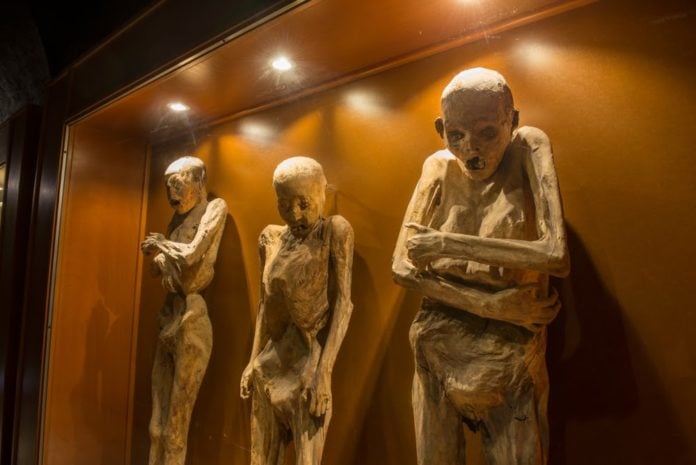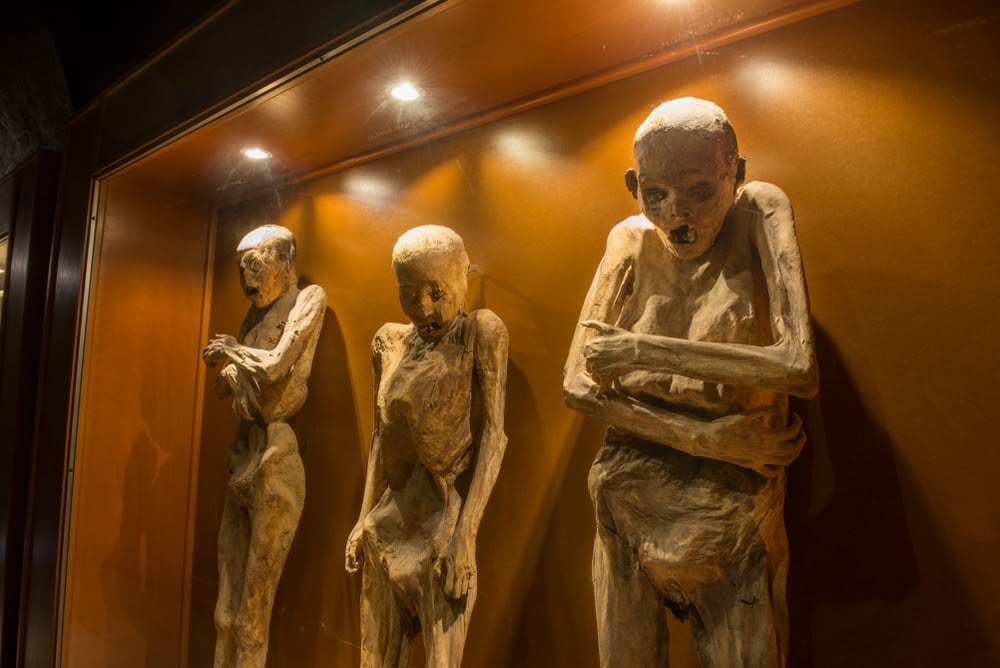

18. District Six Museum, South Africa
District Six Museum can be hard to see because it’s located in an old church in a small inner-city residential area. This is a newer museum because it focuses on the history of the Apartheid in South Africa in the 1970s, which is a particularly brutal time period.
Over 60,000 people were exiled from their homes in the District Six area during the government-enforced segregation of Cape Town. The museum is full of any type of memorabilia from that period from street signs for photographs. It’s also a place to remember the 60,000 people and so many more affected by the Apartheid.

17. Museum of Devils, Lithuania
Going to a place that’s called the “Museum of Devils” is not on everyone’s to-do list, but it’s definitely worth it. The museum isn’t as frightening as you would think, though some of the pieces of artwork can look scary. This museum honors the sculptures of Antanas Žmuidzinavičius, an artist during the Soviet Era.
During this period, you couldn’t keep religious artwork or structures in your home, which is why Žmuidzinavičius kept his work hidden in his basement. It wasn’t until near the end of his life that he allowed the public to look at his work. Today, 3,000 devil sculptures pull you into the museum and make you want more.

16. Museum of Bread Culture, Germany
You’ve probably heard the phrase, “Greater than sliced bread,” when you’re talking about something amazing that’s come out or happening. Well, the Museum of Bread Culture in Germany doesn’t believe that anything is better than bread, no matter what it is.
This museum examines the 6,000-year history of humans eating bread. The museum is filled with thousands of artifacts dedicated to bread over the last few centuries. However, you can’t receive a piece of bread to eat, but you can walk down the street to a local bakery.

15. Museum of Food Anomalies, Online
Speaking of bread, there is also a museum that’s dedicated to food gone wrong. The best part is you can view this museum from any location because it’s completely online. You can see pretty much any type of food by the pictures someone took, such as an egg monster or the Virgin Mary Burrito.
Some foods look like they’re smiling back at you, a french fry that looks like it was to walk away, a Cheeto man, and a banana peel with what looks like the face of Jesus. Another fun plus of this interesting Internet museum is they have a few fun activities, such as a Monster Movie Title Generator.

14. Corpus Museum, Netherlands
The Corpus Museum in the Netherlands might sound like a nightmare to some people, especially if you have a fear of crawling due to watching too many horror movies. But, this museum is meant to be a human biology interactive museum and teach you what a parasite feels like.
Through the exhibits at the museum, you’ll experience crawling around in your body, starting from your mouth. You will then follow the tour as the crawling sensation goes throughout your body, making sure to stop at each organ. Of course, you’ll exit the museum through the intestines – well, you get the picture.

13. Museum of Enduring Beauty, Malaysia
The Museum of Enduring Beauty probably sounds more like one of the world’s most beautiful museums instead of weirdest. While it’s a museum that focuses on beauty from different cultures, there are other parts of the world, especially the western world, that won’t find some of the exhibits beautiful.
Part of the museum is filled with beautiful photographs and sculptures of beauty practices, such as earlobe stretching and scarification. But then, there are drastic rituals, such a head molding, and foot binding, which remained popular in China until the early 1900s. It’s this part of the museum that some cultures will struggle with, but it’s important to remember it’s a bit of the world’s history.

12. Underwater Museum of Art, Mexico
Cancún’s Underwater Museum of Art is dedicated to the art of conservation. It’s truly a one of a kind museum that makes visitors want to return and unable to describe it in one word, so they often say it’s cool, creepy, and fascinating.
There are dozens of sculptures that sit on the bottom of the sandy shores of Cancun, and you can see this through a glass boat as you walk above the water. There are various types of sculptures, ranging from a crowd of people to a vintage VW Bug. One of the cool things about the sculptures is seaweed and coral is starting to take over them, so you can also see this process and stop in every year or two.

11. Plastinarium, Germany
If you like to learn about human anatomy, you’ll love the Plastinarium museum in Germany. Physician Gunther von Hagens invented plastination in 1977. It’s a technique used in anatomy to preserve bodies or body parts. Basically, this happens when fats and water are replaced by certain plastics, allowing them to be touched and taking out the smell and decay that usually occurs.
By now, you can guess the Plastinarium museum is full of morbid art. Not only can you see examples of what plastination can do, but you can learn all about the process from beginning to end. Much of the display you will see are animals, such as giraffes with flayed necks, but you’ll also get a view of human body parts and whole bodies, such as the three men playing cards at the table. Yes, Hagens had a bit of humor to entertain his visitors at the museum.

10. Glore Psychiatric Museum, United States
It’s a popular topic – mental health. Most people know the horrors that doctors put mental health patients through in the past, at least those who lived in the United States. The Glore Psychiatric Museum, located in Saint Joseph, Missouri, gives visitors a chance to see this history through its displays.
This museum houses steel hydrotherapy tanks where patients would be subjected to freezing cold baths that led them into hyperthermia. You’ll also observe a variety of pictures, read and hear about stories from survivors, and see a hamster wheel where patients could run off their excess of nervous energy. While this museum is excellent when it comes to its educational focus on the past, there are parts where you’ll need to hold on to your sanity and emotions as times can get tough.

9. International Cryptozoology Museum, United States
The International Cryptozoology Museum is located in Maine and focuses on some of the biggest myths in the United States. Not only do you learn more about mermaids, the Mothman, and the Loch Ness monster, but you also learn about Bigfoot.
One of the items you will see in the museum is a Yeti hair samples from between 1959 and 1960. It’s been featured in several documentary films. You’ll also see several fossilized footprints and testimonials of campers that claim to have seen proof of the myths and legends surrounding the United States.

8. Museum of Broken Relationships, Croatia
After this list, you’ll think that you can create a museum from pretty much anything or any life event. In a way, you’re right. One example is the Museum of Broken Relationships in Croatia, where thousands of people travel to share their stories of heartache.
Not only does this museum hold stories, but also many artifacts. For example, there’s chopped furniture that one man donated after his ex took an ax and chopped his couch into small pieces. She then decided to ship the remains of the sofa to him, which he chose to display in the museum.

7. Beijing Tap Water Museum, China
Even if you don’t like the tap water you get out of your sink, you need to look into the Beijing Tap Water Museum in China. Water is essential for life, which means it’s been around since the beginning of time. While the history of water wasn’t recorded this whole time, Beijing took it upon themselves to supply the history of Beijing’s water.
You’ll get to read stories about how pipe water came to be in the early 1900s and how many people, especially rural people, weren’t interested in it because they liked their well water. You can also read how China has changed policies and made their water some of the best drinkable water in the world.

6. Museum of Human Disease, Australia
Before you wrinkle up your nose at this museum, you need to learn a little more about it. The Museum of Human Disease, located in Sydney, Australia, is definitely one of a kind and is probably more interesting for some people than others. In fact, if you can’t stomach a lot of medical diseases, you need to prepare yourself.
Not only will you get the history of dozens of diseases from different parts of the world and periods, but you’ll also see a lot of these diseases on display – in a way. For instance, you can see people with certain conditions, like leprosy and an embalmed tumor. However, don’t think that this museum isn’t for children. There’s a heart made out of play-doh in their children’s area.

5. Shin-Yokohama Ramen Museum, Japan
Some people who view the Shin-Yokohama Ramen Museum see it as a museum while other people see it as a food court. Part of the reason is ramen museums in Japan really aren’t strange, but this one is different from most.
It brings a taste of a museum to you by giving you a taste of Japan in the 1950s with its wooden building facades and red lanterns. The museum is outside in its own area where you can go from building to building and sample different types of ramen. Of course, you can get much history from the servers you speak with during your ramen taste testing.

4. Museum of Witchcraft, England
Depending on your beliefs will depend on whether you see the Museum of Witchcraft in England as part of this list or not. It’s actually a highly interesting museum, especially if you are interested in history like the Salem Witch Trials. England is full of history about the history of pagan and Wiccan folklore, and you can see all of this by taking a tour of this museum.
One of the most popular exhibits brings you back to the Medieval age. It includes a full-scale replica of a 19th-century cottage that houses a witch mannequin using the Tarot cards. There are also hundreds of other witchcraft items up to the present day to help give you the best history.

3. Condom Museum, Thailand
The Condom Museum easily explains what it’s about. Yes, your thinking is correct. In fact, there’s not one room entirely dedicated to condoms but two places. If you live in Thailand, the condom museum isn’t as strange as most people think. It makes sense because residents know that their country is one of the world’s largest producers of prophylactics.
If you want to learn as much as you can about condoms, this is a museum you need to write down on your bucket list. Not only will you learn about the history of condoms, but you’ll see what the first condom looked like and learn all about their sizes and flavors. You will also want to make sure that you stop in and learn about other bedroom heroes, such as all the fun grownup toys that are around the world. Isn’t that an interesting history to brag to your friends about?

2. Kunstkamera, Russia
Just like you’ll need a stomach for the Plastinarium museum in Germany, you’ll want one for the Kunstkamera museum in Russia. You’ll probably find yourself guarding your stomach as much as possible because this museum is full of exterior bellies.
Many people find the exhibits a bit gruesome as embalmed human deformities run up and down the walls of the museum. Peter the Great established this museum, and it’s also known as the first museum in Russia. People enjoy seeing the most gruesome display, which is also its most popular, the preserved head of William Mons, a close confidant of Peter I. Unfortunately, the two didn’t see eye to eye, in the end, so Mons lost his head to a jar filled with alcohol in 1792.

1. Museum of the Mummies, Mexico
Depending on where you sit on the mummy movies or how you feel about the dead rising to earth one day will depend on what you think about heading to the Museum of the Mummies in Mexico. In a big way, this museum happened naturally. It wasn’t something that someone decided to put together because the climate in Guanajuato naturally mummifies bodies.
However, this doesn’t mean that all the mummies are from different eras. They are all from the 1830s and died during the significant cholera outbreak of 1833. All the bodies were disinterred when the local authorities imposed a new burial tax, and the dead couldn’t pay. Don’t be fooled; it’s a haunting museum. In fact, it’s the inspiration for the Ray Bradbury story, Next in Line.
Sources:
“10 Weirdest Museums In The World.” Noma Nazish, Forbes. September 2019.
“Plastinarium.” Allison, Atlas Obscura.
“10 of the world’s weirdest museums.” Tamara Hinson, Rough Guides. May 2017.
“The Weirdest Museums In The World, Ranked.” Jen Batler, Rough Maps. November 2019.